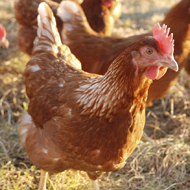
Lancashire farmers now free to move livestock
Restrictions following an incident of avian flu at a farm in Lancashire have been lifted, the government has confirmed.
The lifting of the restrictions means that farmers within the 10km restriction zone around the infected farm are now allowed to move poultry and other animals without restriction.
A high severity H7N7 case of avian flu was confirmed in chickens at a farm in Preston in July. Robust action was taken to prevent the spread of the disease and a restriction zone was placed around the property.
The restrictions have been lifted 30 days after the premises were disinfected and cleaned - the earliest point allowed under EU rules to end the controls.
In a statement, chief vet Nigel Gibbens said: "Protecting our country from animal disease is vital for our economy. Our robust, swift and intensive approach to tackling this incident, and confirming the disease was contained to a single farm, means we have been able to lift these restrictions at the earliest possible point allowed by EU law."
He added: "The UK remains at a constant low risk of an incident of avian influenza and this latest case should serve as a reminder for the poultry industry of the importance of maintaining strict biosecurity to minimise the risk of infection."
Defra urge anyone who suspects avian influenza to contact their nearest APHA office immediately.



 HMRC has invited feedback to its communications regarding the employment status of locum vets and vet nurses.
HMRC has invited feedback to its communications regarding the employment status of locum vets and vet nurses.